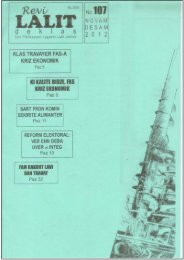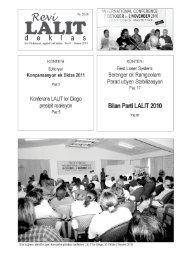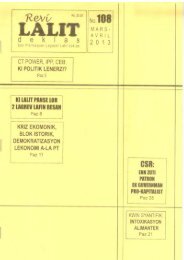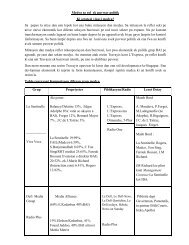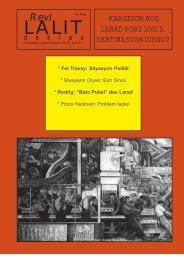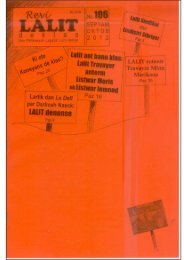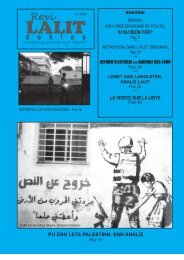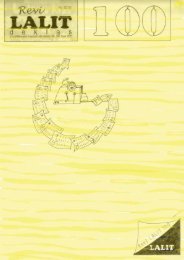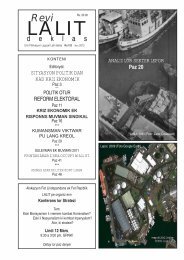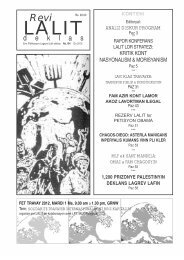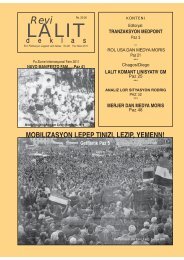Against communalism of the best-loser system - Lalit Mauritius
Against communalism of the best-loser system - Lalit Mauritius
Against communalism of the best-loser system - Lalit Mauritius
You also want an ePaper? Increase the reach of your titles
YUMPU automatically turns print PDFs into web optimized ePapers that Google loves.
Ano<strong>the</strong>r difficult terrain for <strong>the</strong> state to get into – even when merely seeking pointers as to<br />
someone’s way <strong>of</strong> life – is <strong>the</strong> terrain <strong>of</strong> who exactly is a person practising a religion and who is<br />
not. When questioned about names being “Muslim” names or not, and about “who” exactly is a<br />
“Muslim” or not, Yousouf Mohamed again saw his witness, Maulana Haroon, scoring an own<br />
goal. He said that in his opinion people who are Ahmadiya are not “Muslim” and are not<br />
“members <strong>of</strong> <strong>the</strong> Muslim community”. This is a very thorny problem for <strong>the</strong> state to get<br />
involved in: when some people claim to practice a particular religion, while o<strong>the</strong>rs who claim to<br />
be practitioners actually deny that <strong>the</strong> first ones are practitioners <strong>of</strong> <strong>the</strong> religion.<br />
In <strong>the</strong> section on “Big Bro<strong>the</strong>r”, it should be mentioned that Counsel for <strong>the</strong> Applicant, Yousouf<br />
Mohammed, once given free rein, seemed to lose all respect for people giving personal answers.<br />
We were subjected to <strong>the</strong> nasty spectacle <strong>of</strong> seeing deeply private questions being invoked in<br />
public, not as facts relative to <strong>the</strong> public domain, but as as part <strong>of</strong> <strong>the</strong> strange ritual <strong>of</strong> <strong>the</strong> state<br />
“classifying” someone, <strong>of</strong>ten on <strong>the</strong> basis <strong>of</strong> his mo<strong>the</strong>r and fa<strong>the</strong>r’s “community”. It felt deeply<br />
sullying to everyone present, deeply reminiscent <strong>of</strong> Apar<strong>the</strong>id.<br />
To give an example <strong>of</strong> <strong>the</strong> excesses. Counsel for <strong>the</strong> Applicant asked Diya Dholah <strong>the</strong> names <strong>of</strong><br />
her parents, thus starting <strong>the</strong> process <strong>of</strong> classifying Ms Dholah by classifying her parents first.<br />
They are both dead. They died at <strong>the</strong> ages <strong>of</strong> 48 and 57 respectively within a matter <strong>of</strong> months<br />
<strong>of</strong> one ano<strong>the</strong>r, leaving 9 children, eight <strong>of</strong> <strong>the</strong>m not yet married at <strong>the</strong> time. The violence <strong>of</strong> <strong>the</strong><br />
turn <strong>of</strong> questioning became apparent to everyone present in Court who knew that both her<br />
parents are dead. She gave <strong>the</strong>ir names. This meant that because she had stood as a candidate for<br />
general elections, she was subjected to <strong>the</strong> humiliation <strong>of</strong> having her dead parents classified in<br />
public.<br />
In <strong>the</strong> same vein, <strong>the</strong> Counsel <strong>the</strong>n went on to insult Rada Kistnasamy for not knowing <strong>the</strong> “real<br />
name” <strong>of</strong> his fa<strong>the</strong>r, for only knowing a “nom gate” <strong>of</strong> his own fa<strong>the</strong>r, who Rada Kistnasamy<br />
had already said was dead. Those <strong>of</strong> us who know that his fa<strong>the</strong>r died before Rada was big<br />
enough to remember him were again quite upset at <strong>the</strong> line <strong>of</strong> questioning, classifying a fa<strong>the</strong>r<br />
he had never known. Later we found out that <strong>the</strong> name Rada Kistnasamy had given was his<br />
fa<strong>the</strong>r’s real name. That was what Yousouf Mohammed was laughing at in public in Court.<br />
Then he asked Rada Kistnasamy what his son was called. When he gave his son’s name,<br />
Yousouf Mohammed seemed amazed. Immediately after this, when Rada Kistnasamy refused to<br />
answer questions about his religious faith, Yousouf Mohammed went on to threaten to get him<br />
locked up for contempt <strong>of</strong> court for refusing to answer a question about his religion. Then <strong>the</strong><br />
Judge stepped in, saying that Mr. Mohammed had not threatened previous members <strong>of</strong> <strong>Lalit</strong><br />
with being locked up, so it was not appropriate to start threatening one member now.<br />
But by <strong>the</strong>n, no-one present had ever seen so shaming an event in Court.<br />
So much for <strong>the</strong> state getting involved in this kind <strong>of</strong> private matter.<br />
The real meaning <strong>of</strong> <strong>the</strong> four words “his way <strong>of</strong> life” in <strong>the</strong> Schedule<br />
There could be nothing more difficult to distinguish in only a few words any one human being<br />
relative to any o<strong>the</strong>rs than by <strong>the</strong> vague term “his way <strong>of</strong> life”, or as it should be termed to be<br />
more precise “his or her way <strong>of</strong> life” which incidentally already implies two categories, that <strong>of</strong><br />
male and female. The words “his way <strong>of</strong> life”, in ordinary English, mean quite simply<br />
everything about a human being.<br />
The broadest differences in “way <strong>of</strong> life” between different Mauritians would probably be<br />
between people who work and live at sea, and those who work and live on <strong>the</strong> land. The way <strong>of</strong><br />
life <strong>of</strong> a pr<strong>of</strong>essional sailor or fisherman, and that <strong>of</strong> o<strong>the</strong>rs is different. Or between night-shift<br />
workers and <strong>the</strong> rest <strong>of</strong> us. Or between those living in a “dependance” and o<strong>the</strong>rs. Those who<br />
are house-bound and those who move around every day. Those who are hedonists, and those<br />
who work doggedly through life. Those who are young and those who are old. Or between <strong>the</strong><br />
four categories: Employer, employee, unemployed, self-employed. More objectively put,<br />
whe<strong>the</strong>r one buys <strong>the</strong> labour <strong>of</strong> o<strong>the</strong>rs or sells one’s own labour to ano<strong>the</strong>r, or seeks to sell one’s<br />
labour but cannot find a buyer, or produces and sells something independently. Or between<br />
those without a home and those with a home. Or between rich and poor.<br />
Justice Seetulsingh, himself said: “Our attention was drawn to <strong>the</strong> fact that a way <strong>of</strong> life can<br />
also be dependent on class distinction, for a rich H… and a rich S-M… may have a similar way<br />
<strong>of</strong> life, depending on <strong>the</strong>ir financial means, whereas a rich H… and a poor H…. may lead<br />
altoge<strong>the</strong>r different ways <strong>of</strong> life.”<br />
And indeed it would be hoped that a good political <strong>system</strong> would one day end up “representing”<br />
all <strong>the</strong>se different categories fairly.



